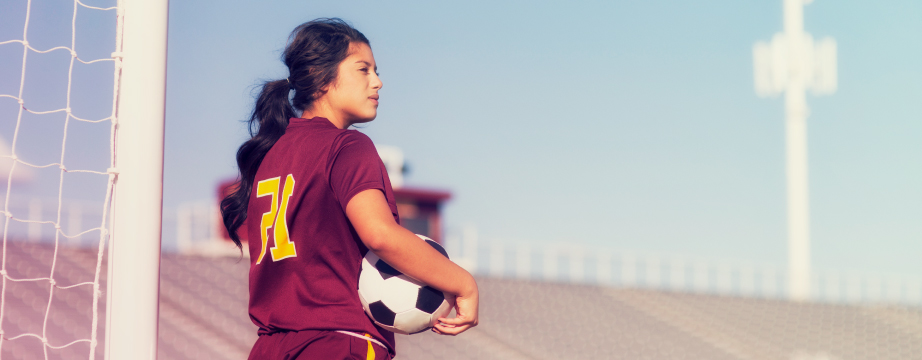How to Support Athletes Who Transition Out of Sports

When the COVID-19 pandemic sent athletes home from the field, players of all ages and levels were left unable to practice or play sports for months—some were even forced to retire early. For many players, leaving a sport also means leaving behind a set of routines, access to a support system, and a sense of identity.
Sports undoubtedly dominate a player’s lifestyle. Without the opportunity to play, many athletes are left with confusion, anxiety, and grief over the lifestyle they lost.
But athletic careers aren’t just for players who pursue professional sports. “The term career is not simply a job or occupation. It is an individual’s journey through life,” said Dr. Michele Kerulis, member of Counseling@Northwestern’s core faculty and member of the United States Olympic Committee Sport Psychology Registry.
When counselors have a nuanced understanding of the mental health implications of leaving a sport, they can effectively help athletes transition out of sports in a healthy way and renew their identity, self-worth, and purpose in life.
Why Do Athletes Transition Out of Sports?
Making the choice to leave a sport at any age—especially after investing years of practice and competition—can be a complicated and difficult decision. But it may not always feel like a choice. Dr. Kerulis said that most decisions fall into one of two categories:

VOLUNTARY:
Choosing to stop playing or practicing a sport or activity
Examples: change in personal interests, career changes, family circumstances

INVOLUNTARY:
Feeling forced into leaving a sport or activity
Examples: injury, being cut from a team, contracts, global pandemic, age
While every person’s individual response depends on their unique circumstances, Dr. Kerulis said “people who have involuntary transitions out of sports can feel a lot more taken aback by an interruption in their life that they didn’t plan, so that can feel a little bit more traumatic.”
She said that in many cases, athletes may struggle to find purpose, motivation, and identity from other activities, especially if they haven’t been encouraged in the past to explore other interests, talents, and aspirations.
Without that exploration and encouragement, athletes are at risk of developing a “foreclosed identity,” which means a premature commitment to an athletic identity without considering the value of other interests or aspects of identity, according to developmental psychology theorists including Erik Erikson and James Marcia.
“Their entire identity rests in being an athlete, whereas other people who are just as committed to sports still might have other things in their life,” Dr. Kerulis said. “[Those who] make time for family and friends and volunteering or other activities tend to adjust better than those with a high sense of athletic identity.”
Dr. Kerulis said that self-reflective questions can help athletes of all ages consider additional areas that might provide a sense of purpose and identify ways they can apply their learned athletic skills to new opportunities.
Self-Reflective Questions to Prevent a Foreclosed Identity:
- What is it that I love about sports? Is it just this sport, or other sports, too?
- In addition to sports, what else do I like to spend time doing?
- What else am I looking forward to in the near future?
- Where do I find validation and affirmation (externally and internally)?
- What skills have I learned from my sport, and how can I use them off the field?
These questions can help athletes frame their transition in a positive way, by approaching the change with curiosity, abundance, and creativity. Though it’s important to make space for grief, Dr. Kerulis said “some people may feel excited about opportunities for a new chapter in their life.”
How Counselors Can Help Athletes Transitioning Out of Sports
Regardless of the reasoning, it’s important to remember that transitioning out of sports is not an event; rather, it is a process.
“When somebody is invested physically and emotionally in their sport, and then they’re not participating anymore, they typically go through a grief process,” Dr. Kerulis said. “Even if they made the choice to leave the sport, they’re walking away from something that used to be an entirely encompassing aspect of their life.”
When leaving a sport, athletes of all ages may be at risk for mental health concerns that need professional attention from a licensed mental health counselor.
Mental Health Risks Posed By Transitioning Out of Sports
ANXIETY
fear and uncertainty about plans for the future or career paths
DEPRESSION
loss of identity and motivation, feelings of purposelessness
GRIEF
loss of activity, purpose, structured routines, and teammates’ support
DISORDERED EATING
changes in diet and exercise in a non-athletic environment
INSECURITY
loss of confidence or external validation from coaches and teammates
Source: Student-Athlete Transition After Sports, (1.2MB, PDF), NCAA
Dr. Kerulis said swift departure from years-long routines can lead to confusion about purpose and the meaning of one’s own life. “Some people experience an existential crisis,” she said. “Especially for younger people who might think, ‘my whole purpose in life was to play sports, and since I’m not doing that, I don’t know what to do.’”
Counselors can help athletes of all ages address a foreclosed identity and transition out of sport with sensitivity and cultural awareness.
“There is an older way of thinking that things have to be all or nothing, meaning that you must commit 100 percent of your time to one thing, or you are not going to be successful, and that’s just not the case,” she said. “[Counselors] help people understand that you can be an awesome athlete—a recreational, professional, or college athlete—and still enjoy other areas of life.”
Without that exploration and encouragement, athletes are at risk of developing a “foreclosed identity,” which means a premature commitment to an athletic identity without considering the value of other interests or aspects of identity.
When helping people explore other interests or decide to fully terminate their athletic participation, Dr. Kerulis said counselors should make developmentally appropriate recommendations for athletes.
“Student-athletes who understand how to terminate their sport careers in a healthy way can better transition into the next stages of life as well-balanced individuals with goals and direction for personal excellence,” she said.
When athletes are beginning to realize that career termination may be in their near future, a clinician can help support them through the process to establish support and goals for a healthy transition.
In order to be culturally sensitive to the sports community, counselors with athletic clients need to spend time learning about the world of sports, cultural and community considerations, and the unique mental health risks for athletes. Dr. Kerulis offered tips for counselors to be an effective and helpful support to their clients:
How Counselors Can Help Athletes Transition Out of Sports
- Identify the student-athlete’s current stage of development and utilize appropriate interventions to help them successfully pass through that stage.
- Encourage student-athletes to create a well-rounded identity at each stage of development.
- Listen to athletes’ experiences and concerns to learn about the nuances of their particular sport.
- Consider how gender identity and cultural identity affect development and experiences playing sports.
- Collaborate with athletes, parents, educators, and athletic departments to create a plan for the future.
- Consult with experts in sports, listen for information about athletic culture when talking with athletes (e.g., rules of the game, rituals, and expectations), attend sporting events, and watch sports on television.
- Combat academic corruption and encourage student-athletes to have high integrity in the classroom or place of work.
- Build a network of medical professionals and other providers specializing in sports injuries, sport psychology, athletic nutrition, and kinesiology.
- Learn about common types of injuries that athletes experience in a specific sport, and, in collaboration with their medical team, help athletes understand the future of their career in sports due to the injury.
- Suggest that younger student athletes engage in play outside of their sport to help familiarize them with multiple groups of friends and styles of play.
- Receive supervision from a qualified clinician who has experience working with athletes and navigating the intricacies of sports culture.
Counselors should also be aware of behavioral changes that result from transitioning out of a strict athletic schedule and into new routines. The dietary and fitness practices that may be common in weight-focused sports such as gymnastics, wrestling, bodybuilding, or ballet are often perceived as disordered eating in nonathletic environments. Becoming familiar with the symptoms and risks of these behavioral addictions related to former athletic routines will be crucial for identifying and preventing harmful behaviors.
Dr. Kerulis also emphasized the importance of a nonjudgmental and individualized approach to supporting athletes through their grief and transition. Though each person responds to emotional events in different ways, many athletes are subject to the pressure of performance and may fear being judged for their feelings or reactions during their process.
How Coaches, Family, and Teammates Can Help
“While families are typically the ones guiding student-athletes through their younger years, from a family-systems theory lens, their teammates are often viewed as siblings and their coaches as surrogate parents in their sport careers,” Dr. Kerulis said.
The relationship between athletes and their coaches can be pivotal to a player’s process in career transition because coaches can be a meaningful source of support during times of confusion, grief, and stress. Because of this, Dr. Kerulis said coaches should pay close attention to changes in a player’s demeanor and be willing to foster open communication. Once players know their coach is genuinely invested in their well-being, it becomes easier to turn to them for support.
“While families are typically the ones guiding student-athletes through their younger years, from a family-systems theory lens, their teammates are often viewed as siblings and their coaches as surrogate parents in their sport careers.”
-Dr. Michele Kerulis, Counseling@Northwestern faculty member
“Coaches are such a vital part of athletes’ lives,” Dr. Kerulis said. “Just like they develop skills to help athletes excel on the field, they can also help athletes develop skills off the field.”
While each member of a team is a crucial part of the athlete’s support system, they each play a different role. “The older teammates help set expectations and can be seen as mentors or big brothers [and] sisters to the younger student-athletes, and the coaches set rules, expectations, schedules, and curfews while student-athletes are away from home.”

FAMILY, FRIENDS, AND TEAMMATES
- Validate the individual’s feelings and experience.
- Make space for candid discussions about grief.
- Be future-focused for new opportunities.
- Schedule activities to do together or look forward to.
- Ask them how they would feel best supported.

COACHES
- Develop healthy supportive relationships.
- Invite players to openly discuss their feelings.
- Offer examples of other athletes’ post-career success.
- Practice empathy and withhold judgment about players’ emotions.
- Ask players what they want out of their next chapter of life.
Open dialogues are especially helpful for teaching young athletes about the value in expressing their feelings, especially for learning the importance of giving more than one-word answers to questions.
“The responsibility lies on adults to help children understand how to have a conversation,” Dr. Kerulis said. She suggests modeling open communication and expressing genuine interest in children’s thoughts, ideas, and interests.
She also said it’s important for adults to show young people that perfection and high performance are not the only avenues to self-worth. When kids and teens learn that it’s okay to fail, they become more resilient and willing to explore new areas and interests. Additionally, they will be more willing to learn valuable lessons from their failures.
“We want kids to learn that they can explore and can try different things and if they don’t like them that’s okay, but at least they tried.”
Additional Resources for Athletes Transitioning Out of Sports:
- Mental Health, NCAA Sport Science Institute
- The COVID-19 Pandemic: Tips for Athletes, Coaches, Parents, and the Sport Community, Association for Applied Sports Psychology
- Resources for Athletes Sidelined by Injury or Health Condition, Sidelined USA
- Sidelined Stories: Podcast for Medically Sidelined Athletes, Sidelined USA
- Child Considering Quitting During the Pandemic? Things to Consider, Positive Coach
- What to Do When Your Child Wants to Quit Sports, Cleveland Clinic
Citation for this content: Counseling@Northwestern. (2021 June, 7). How to support athletes who transition out of sports. Counseling@Northwestern, the Online Master of Arts in Counseling Program from The Family Institute at Northwestern University.

